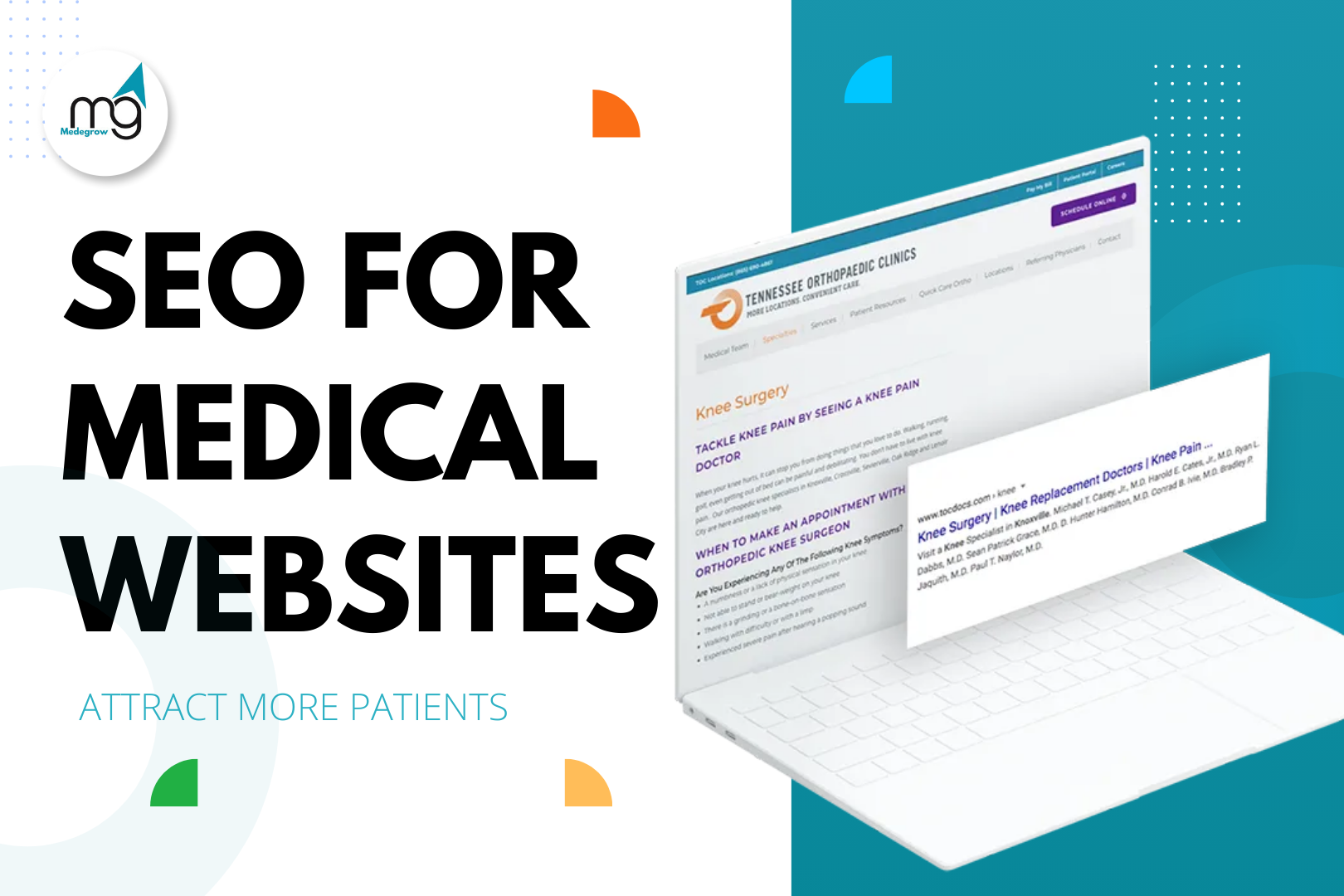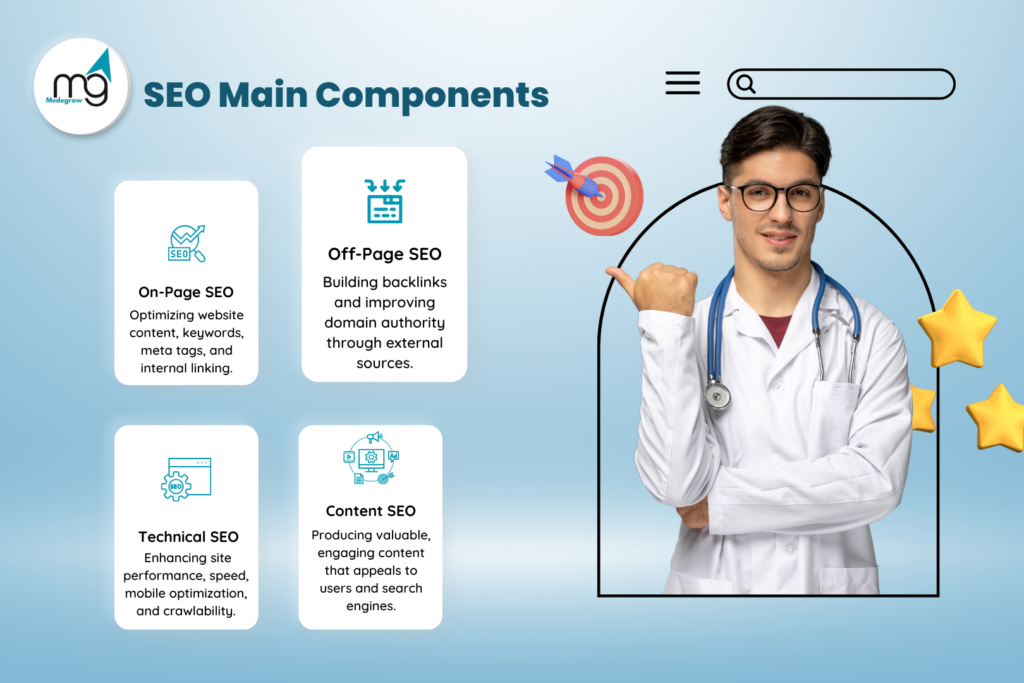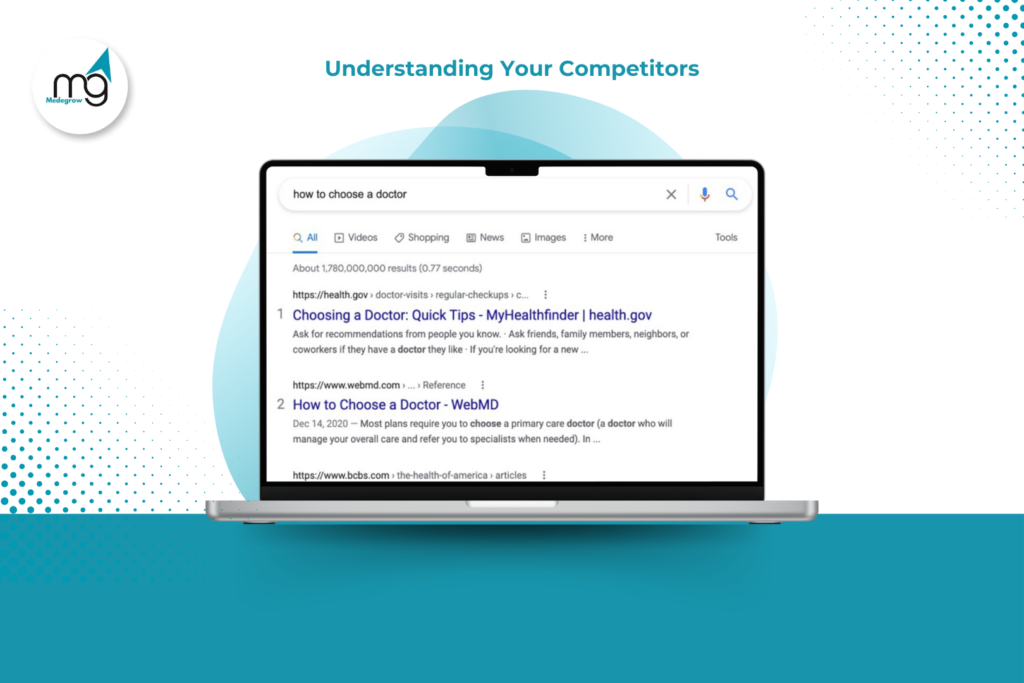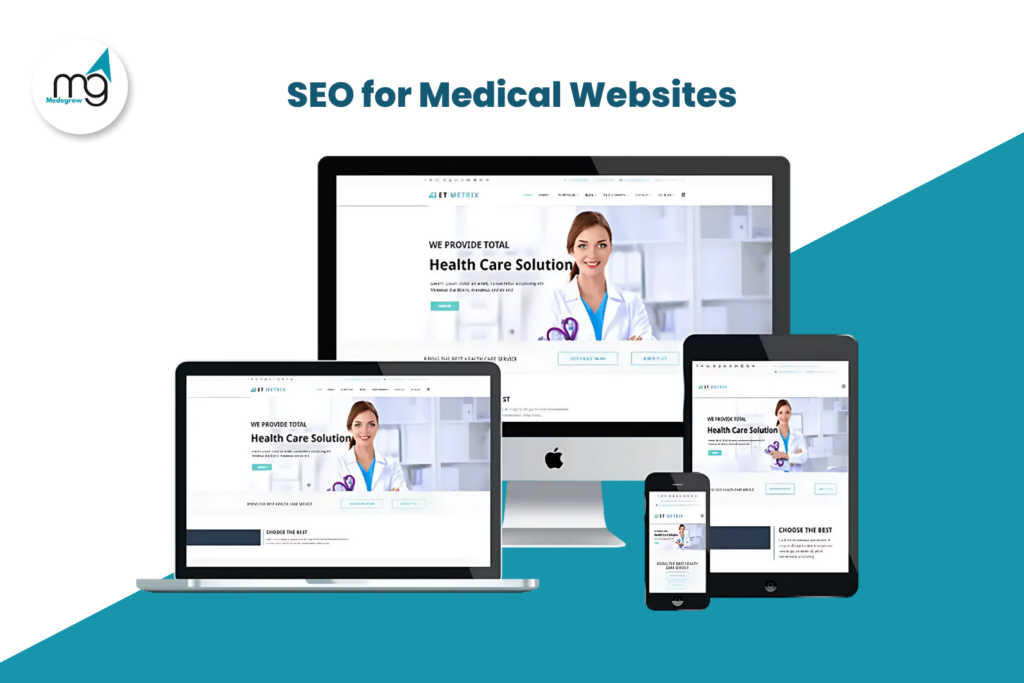
In today’s digital age, medical professionals must establish a strong online presence to stay competitive. One of the most effective ways to do this is through SEO for Medical Websites, a digital marketing strategy designed to enhance website visibility and attract more patients. This article will guide doctors and healthcare providers through SEO strategies specifically tailored to medical websites.
What is SEO and Its Importance for Medical Websites?
SEO for Medical Websites refers to the process of improving a website’s visibility in search engine results pages (SERPs). By optimizing a medical website, doctors can ensure that potential patients find their practice when searching for relevant healthcare services.

In a world where over 70% of patients search for healthcare providers online, having a robust digital presence is crucial. Whether you run a clinic or a hospital, SEO for Medical Websites helps you compete in the crowded healthcare market by enhancing your visibility.
Purpose of the Article
The goal of this article is to educate doctors and healthcare providers about the importance of SEO for Medical Websites and how they can apply it to their sites. The right SEO strategies can help medical professionals grow their practices by making it easier for patients to find them online.
Understanding SEO for Medical Websites
SEO consists of three main components: on-page SEO, off-page SEO, and technical SEO.
- On-page SEO involves optimizing the content on your website, ensuring it is relevant, valuable, and aligned with user search queries.
- Off-page SEO refers to actions taken outside your website, such as building backlinks from reputable sites, to improve your authority.
- Technical SEO focuses on improving your website’s infrastructure, ensuring it’s easy to navigate, fast, and optimized for mobile devices.

Why is SEO Critical for Medical Professionals?
- Increased Visibility in Search Results: A well-optimized medical website is essential for SEO for Medical Websites, ranking higher in search engine results and making it easier for patients to find. For instance, if someone searches for “best cardiologist near me,” a properly optimized site will appear higher, increasing the likelihood of a potential patient choosing your clinic over competitors
- Building Trust and Credibility: A well-optimized medical website is vital for SEO for Medical Websites, helping it rank higher in search engine results and making it easier for patients to find. For instance, if someone searches for “best cardiologist near me,” an optimized site will appear higher, increasing the chances of a potential patient choosing your clinic over competitors
Key Elements of SEO for Medical Websites
- Keyword Research for Medical Practices
- Identifying Relevant Keywords: Identifying and incorporating relevant keywords that potential patients are searching for is crucial for SEO for Medical Websites success. For medical practices, these often include terms like “pediatrician in [city]” or “urgent care near me.””
- Tools for Keyword Research: Effective tools like Google Keyword Planner and SEMrush allow healthcare professionals to discover high-traffic keywords specific to medical queries. These tools help identify terms patients use to find specific services, conditions, and treatments.
2. On-Page SEO Best Practices
- Optimizing Website Content: Website content should be educational, clear, and informative, particularly for SEO for Medical Websites. It should address patients’ questions while naturally incorporating relevant keywords. For example, a pediatric clinic might publish blog posts about common childhood illnesses to attract parents searching for answers.
- Meta Tags and Descriptions: Meta tags and descriptions are vital for SEO for Medical Websites, as they provide brief, keyword-optimized summaries of your content that appear in search results. Well-crafted tags improve your click-through rate by attracting the attention of potential patients.

Technical SEO for Healthcare Websites
- Website Speed and Mobile Responsiveness: Fast-loading websites enhance user experience, reduce bounce rates, and positively impact search engine rankings. With more patients using smartphones to find healthcare services, ensuring your site is mobile-responsive is critical.
- Secure Website (HTTPS): Security is a major concern for patients, particularly when dealing with sensitive medical information. Google also favors HTTPS sites, so ensuring your medical website is secure can boost both your rankings and patient trust.
Local SEO Strategies for Medical Professionals
Local SEO is critical for doctors and is an essential component of SEO for Medical Websites, as most patients search for providers in their geographical area. Local SEO strategies ensure that when patients in your locality search for services, your practice appears prominently in search results.
Google My Business Optimization
One of the most important aspects of local SEO is optimizing your Google My Business profile. This involves adding up-to-date information about your practice, including address, contact details, hours of operation, and services offered. Encouraging positive reviews from patients can also improve your ranking and attract new clients.
Learn more by reading our blog on Google My Business for Doctors for valuable tips on improving local SEO.

Creating Quality Content for Your Medical Website
Types of Content That Attract Patients
- Informative Articles and Blog Posts
- Patient Education Resources
Informative Articles and Blog Posts
Publishing regular, valuable content is crucial for SEO for Medical Websites, helping patients find answers to their health questions, improving engagement, and increasing your search rankings. Blog posts about treatments, symptoms, and medical advancements are highly effective for driving traffic.
Patient Education Resources
Providing patient education resources like FAQs, condition descriptions, and treatment options can set your practice apart. These not only engage potential patients but also position you as an expert in your field.
Incorporating Patient Testimonials That Build Trust Through Reviews
Positive patient reviews are essential for building trust and are a key factor in SEO for Medical Websites. Encouraging satisfied patients to leave reviews can significantly boost your SEO and help attract new patients, as they are more likely to trust a doctor with excellent feedback.

Monitoring and Analyzing SEO Performance
- Tracking SEO Metrics
- Tools for SEO Analysis
Tracking SEO Metrics
To measure the success of your SEO efforts, track key performance indicators (KPIs) such as organic traffic, bounce rates, and conversion rates. These metrics help you understand which strategies are working and where improvements are needed.
Tools for SEO Analysis
Google Analytics and Google Search Console are powerful tools that provide insights into website performance, user behavior, and keyword rankings. Regularly reviewing these metrics allows you to refine your strategies and achieve better results.
Overcoming Common SEO Challenges for Medical Websites
- Understanding Your Competitors
- Keeping Up with SEO Trends
Understanding Your Competitors
Analyzing competitors’ SEO strategies is a critical aspect of staying ahead in the digital healthcare space. By identifying the keywords they rank for and examining their backlink profiles, you can differentiate your practice and improve your rankings.
For further insights, don’t miss our detailed blog on Social Media Marketing for Healthcare Professionals, where we delve into strategies tailored for the healthcare industry.

Keeping Up with SEO Trends
SEO is constantly evolving due to frequent algorithm updates from Google. Staying informed about these changes ensures your website remains optimized and continues to rank well.
Conclusion
SEO is essential for medical professionals looking to grow their practices. By optimizing your website for search engines, you can increase visibility, build credibility, and attract more patients. Prioritizing on-page, off-page, and technical SEO can significantly boost your online presence.
While SEO for Medical Websites can be a powerful tool, it can also be complex and time-consuming. Consider partnering with a professional digital marketing agency to ensure that your medical website is fully optimized and that you are taking advantage of every opportunity to attract more patients.

FAQs about SEO for Medical Websites
What is SEO, and why is it important for medical websites?
SEO is essential for increasing visibility and attracting new patients by optimizing your website for search engines.
How can I find the right keywords for my medical practice?
Use tools like Google Keyword Planner and SEMrush to identify relevant, high-traffic keywords for your specialty.
What are the best on-page SEO practices for medical websites?
Focus on creating valuable content, optimizing meta tags, and improving your site’s structure.
How can I improve my website’s loading speed?
Use optimized images, a reliable hosting provider, and efficient coding to ensure fast loading times.
What is local SEO, and how can it help my practice?
Local SEO helps attract nearby patients searching for medical services in your area.
How often should I update my website’s content?
Regularly publishing fresh, relevant content keeps your site engaging and improves SEO rankings.
How do I track the effectiveness of my SEO efforts?
Use tools like Google Analytics to monitor traffic, conversion rates, and keyword rankings.
What are some common SEO mistakes to avoid?
Avoid keyword stuffing, neglecting mobile optimization, and ignoring analytics data.


